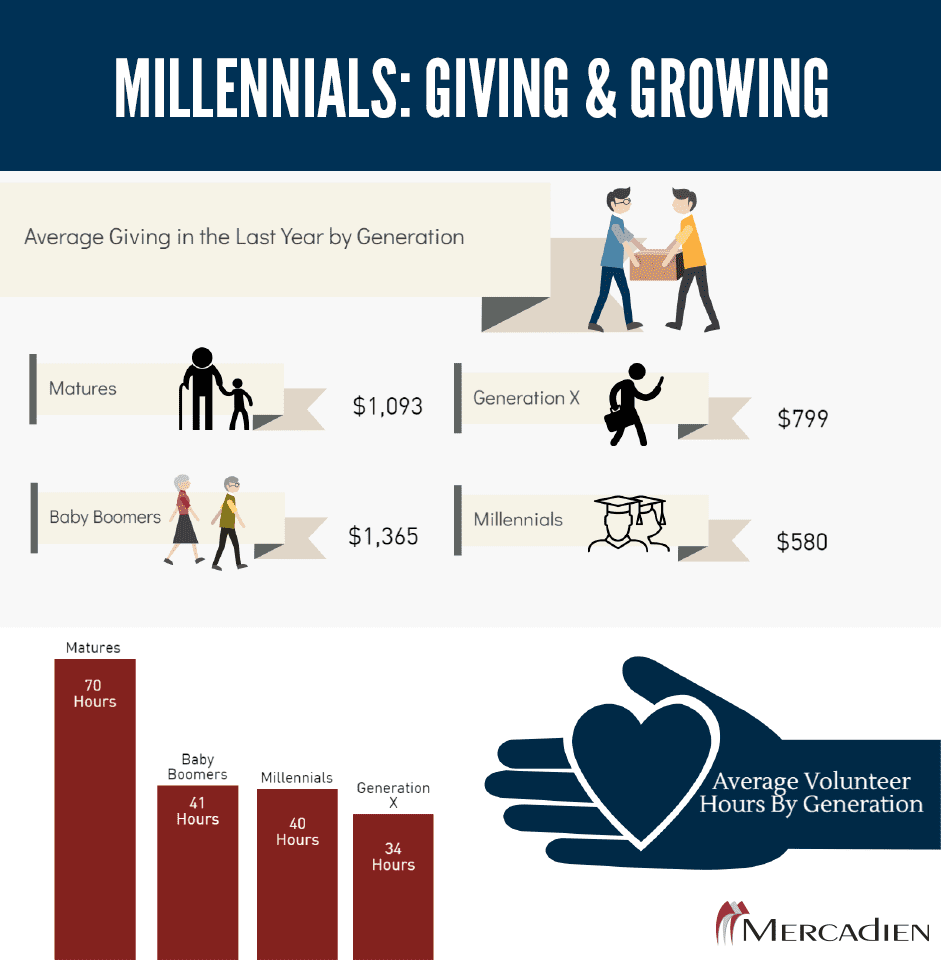Knowledge and Insights
The Future of Philanthropy is Bright as Millennials Mature

Many organizations operate under the presumption that millennials are not as charitably committed compared to older generations. New research findings are challenging this misconception.
Results from a recent study commissioned by Dunham+Company and conducted by Campbell Rinker found that millennials are increasing their donations and charitable commitments as they mature. In this article, we will highlight the major takeaways. If you would like a copy of the survey findings visit https://reports.dunhamandcompany.com/
Survey Highlights
Millennials, defined in this survey as those born between 1982 and 2000, have become the focal point for many nonprofit organizations and rightfully so. According to 2015 U.S. census data, millennials are the largest generation, representing more than one quarter of the nation’s population. They are responsible for 11 percent of charitable donations, a figure that is projected to grow as this generation matures.
Although millennials gave less to charity in the past year (compared to Gen Xers, baby boomers and matures) their behavior paints a different picture. According to the survey, millennials averaged 40 volunteer hours in the past year and twenty-five percent attended church at least once a week. These statistics closely reflect trends for Gen Xers and baby boomers, leading us to presume that millennials are more engaged than we thought.
The following survey highlights give us even more reason to be optimistic about the future of philanthropy as millennials mature.
- The top three types of charities millennials support include places of worship, faith-based nonprofits and education. Volunteerism and attending religious services are two key indicators of a person’s willingness to give to a charity. The takeaway: Faith plays a very important role in the life of U.S. donors.
- 51 percent of millennials have given a gift through a charity’s website. 69 percent of millennials indicate they plan to do so in the future. The takeaway: Nonprofit organizations need to make the process seamless for millennials to donate online through their website.
- Millennials are commonly influenced on social media by their peers to donate. The takeaway: Their peers are asking them to donate. The request is not coming from the organization directly.
- Millennials agreed with the sentiment that charities are more effective than government in providing important services. The takeaway: Millennials recognize the importance of nonprofit objectives.
- 72 percent of U.S. millennial donors indicated that they are more likely to give when their gift will be matched or multiplied. The takeaway: Nonprofits should consider offering an incentive to attract millennial donors.
- In the past 12 months U.S. millennial donors gave $580 to non-church charities. This is 147 percent more than millennials in the U.K. and 83 percent more than Australian millennials. The study revealed similar results when comparing volunteer hours. U.S. millennials volunteered 40 hours last year compared to U.K. millennials with 30 hours and Australian millennials with 28 hours. The takeaway: U.S. millennials are more generous when compared to the millennials of the U.K. and Australia.
Nonprofits should be thinking about the bigger picture; how will they engage millennials as donors? Answering this question today will be the key to future success.
If your organization operates under the presumption that millennials are not as charitably committed compared to older generations, it’s time to re-evaluate your strategy. Contact me today at kneeld@mercadien.com or 609-689-9700 to discuss how Mercadien’s Nonprofit and Human Services team can help you and your organization.

